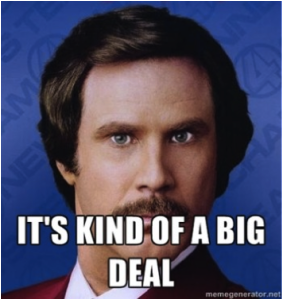Just as there are several types of employees, there are also various breeds of CEO’s. Now, before we lump people into groups, let’s first answer this question: Why is there a need to do this?
Science says we don’t even think when we categorize almost all things. Categorization is cognition according to psychology. The human brain is simply wired like it and we have no choice.
Common sense, however, whispers that categorization is a means of simplifying something so that it can be better or more easily understood. Like what we are going to do below.
So again, what difference does it make if we know the different kinds of CEO’s? A lot. Think from between your losing your precious job to losing billions of dollars.
See, oftentimes, CEO’s know what they’re good at and spend time to hone those skills, but it can be hard to see the flipside of those strengths. For example, a CEO who sees himself as efficient may be viewed by employees as inconsiderate, while the boss who tries to be strategic may be thought of as lethargic and shortsighted. There is always that thin line between good bad when you are sitting at a lofty perch, and perspectives always matter.
The good news is that by recognizing yourself, or that of your CEO, you can capitalize on your strengths and mitigate your weaknesses, or have somebody tell your boss about it. The bad news is that many leaders don’t realize which of the five they are until it’s too late.
THE MAVERICK

The Style: This type of CEO is as famous for his being unconventional as being an astute entrepreneur. He questions institutions and sometimes breaks conventions, but is well-loved just the same.
The Models:

glamurama.uol.com
Facebook CEO Mark Zuckerberg
- built a $ 50 billion company after dropping out of Harvard
- turned down offers from Yahoo! and MTV Networks to buy Facebook
- focused on expanding Facebook, opening up his project to outside developers and adding more features.
- signed the “Giving Pledge”, promising to donate at least 50 percent of his wealth to charity over the course of his lifetime.
Maverick move: His marriage to longtime girlfriend Priscilla Chan came as a surprise to friends and family as guests were told they were being invited over to celebrate Chan’s medical school graduation, but in reality they ended up attending the pair’s wedding. That’s a day after Facebook went public.
Oh, and his annual salary is $ 1. Yep, that’s one dollar — not a typo.

www.capitalbay.news
Mark Cuban, Owner of the Dallas Mavericks of the NBA, cofounder/CEO of Broadcast.com.
- made his fortune through the sale of startups MicroSolutions and Broadcast.com in the 1990s
- also invested in film production, and has appeared on such TV series as Dancing with the Stars and Shark Tank.
- Cuban and a business partner, Indiana alum Todd Wagner, started AudioNet in 1995, renamed it Broadcast, and after a year sold out to Yahoo! for nearly $ 6 billion.
- purchased the Dallas Mavericks for $ 285 million from Ross Perot Jr.
- purchased the Landmark Theatres chain and Magnolia Pictures in 2003
Maverick move: Cuban, who incidentally owns the NBA’s Dallas Mavericks, has amassed more than $ 2 million in NBA fines for his controversial comments over the years. And, uhm, Cuban made his way into the Guinness Book of Records in 1999 by making what was then the largest single e-commerce transaction. And what did he buy? A Gulfstream V private jet–for $ 40 million.
The Problem: There’s a thin line between genius and crazy, and some of Zuckerberg’s critics slam him for irresponsibly allowing Facebook to spread people’s personal data around the Internet.
While Cuban’s own web site (he’s an active blogger) describes him as having a “commitment to winning” that “has everyone’s attention,” his largest fine–$ 500,000–was the result of a remark he made about an NBA referee. He’s also been cited for several “acts of misconduct,” including going onto the floor to vent directly to a referee, screaming at the NBA commissioner David Stern, and using profanity during a postgame interview with reporters.
THE CELEBRITY

The Style: These leaders are as popular, if not more famous than the companies they hold. Sometimes, they are the company’s biggest advertising material.
The Model:

www.svetandroida.cz
Steve Jobs, Founder & former CEO, Apple
- fascinated with electronics and computers at an early age
- In 1976, when Jobs was just 21, he and Steve Wozniak started Apple Computer.
- Helped the company, especially through product design and marketing, become a billion-dollar name in 1980
- Was instrumental as Apple introduced such revolutionary products as the Macbook Air, iPod and iPhone, all of which have dictated the evolution of modern technology
- Even after he had died, he’s still one of the most famous names and most recognizable faces in the world
Celebrity move: Jobs was pushed out of his own company in 1985. Despite the fallout, he later recognized the coup as a blessing in disguise, as it gave him a chance to experiment creatively and purchase an animation studio, which would later be known as Pixar. Eventually he rejoined Apple as CEO in 1997 (and revitalized the failing company).
The Problem: While Jobs is a cult figure, it’s not because of the way he lives – he’s as low-profile as they come – but because of the impact his products have on people’s lives. He’s viewed as leading the “revolution” against bad aesthetics in technology, yes, but the announcement that he was stepping down to battle cancer had the public in mini-limbo.
THE DAREDEVIL

The Style: This type of leader takes both personal and company risks to achieve the goals he has set his eyes into. They believe the journey is just as important as the destination.
The Model:

businessinsider.com
Elon Musk, CEO, Tesla and SpaceX
- Engineer, inventor, and explorer, who at age 12 taught himself how to program
- at age 24, Musk moved to California to begin a PhD in applied physics and materials science at Stanford University
- left the program after two days, launched his first company, sold it to Compaq, and used the money to launch PayPal, which he then sold to eBay
- later on, pursued his other passions: space exploration and the discovery of renewable and clean energy sources.
- Contributed $ 70 million of his own money to Tesla to bring fully-electric vehicles to the mass market
- At SpaceX, he’s trying to revolutionize space tech to enable people to live on other planets
- In 2013, unveiled the Hyperloop, a design for a high-speed transportation system that would send riders through tubes in pods.
Daredevil move: Musk initially found it impossible to get funding for SpaceX, which investors saw as a pipe dream. Musk channeled all his own money into the company to make SpaceX a reality (going against every piece of business advice ever written). In 2013, Musk introduced his latest endeavor — the Hyperloop, a new form of transportation that could theoretically send people from San Francisco to Los Angeles in half an hour by way of pressurized tubes. Musk has said if no one else will build it, he will do it himself.
The Problem: Daredevils are very passionate people. In fact, so passionate that sometimes, the journey matters more to them than the destination. This is where sometimes, hasty decisions brought about by impulse or simply by their unquenchable desire to accomplish something they have set their eyes on happen, much to the detriment of the business. Both Musk and Branson have had brushes with bankruptcy partly because emotion prevailed over sound business sense.
THE EXECUTIONER
Style: This type of CEO puts business results before people. And by people, it means his/her subordinates and employees, not customers.
The Model:

pbs.twimg.com
Jeff Bezos, founder and CEO, Amazon
- had an early love of computers, studied computer science and electrical engineering
- he is considered as an e-commerce pioneer
- as CEO of the largest online retailer, Bezos keeps an eerily tight rein on expenses, eschewing color printers in favor of trusty old black-and-white models
- No one flies first class (though Bezos sometimes rents private jets at his own expense)
- Experiments are hatched and managed by the smallest teams possible (so many teams can be deployed to as many projects at the same time)
- Offices still get cheap desks made of particleboard door blanks, a 1990s holdover that Bezos refuses to change
- Despite the culture of stinginess, Bezos is admired for being pragmatic and efficient
Executioner move: Jeff firmly believes in the “Two Pizza Rule”: if it takes more than two pizzas to feed a work group, then the team is too big. He admits to coddling his 164 million customers, not his 56,000 employees.
The Problem: While this approach often brings business success, it can backfire. Shareholders initially applauded Bezos’s efforts at AOL, but the same cost-cutting zeal that put financial results before all else caused throngs of employees to quit.
THE CONVENTIONAL

Style: Old-school management style, not flamboyant and focuses on the business at hand. Oftentimes, these CEO’s are the company’s founders themselves.
The Model:

Bill Gates, co-founder and former CEO, Microsoft
- Entrepreneur Bill Gates founded the world’s largest software business, Microsoft, with Paul Allen, and subsequently became one of the richest men in the world
- showed an interest in computer programming at the age of 13
- Through technological innovation, keen business strategy and aggressive business tactics, he built the world’s largest software business, Microsoft
- He has consistent been in the top 2 of the world’s wealthiest for more than a decade staring in the late 90’s
- Founder and CEO of the Bill and Melinda Gates Foundation, the largest private foundation in the world
Old School moves: He flew coach until 1997, even though his net worth was already well into the double-digit billions. Bill Gates also doesn’t believe in leaving children a ton of money as inheritance; his three kids (daughters Jennifer and Phoebe and son Rory) are set to inherit just $ 10 million each of his multi-billion dollar fortune.
The Problem: There is little downside for this kind of a CEO until a crisis erupts. So far, Microsoft’s two CEO’s who succeeded Gates – Steve Ballmer and Satya Nadella — have done a good job.
In Conclusion
CEO’s may seem to have everything, but they’re far from perfect. Each type has weaknesses, that, if not recognized and properly addressed, may spell the difference between their company’s success and failure. I’ll leave the solution to them. After all, if they were able to amass the kind of wealth they can’t spend in one lifetime, it would be much easier for them to find out the areas in their management style that need fixing.
But like always, knowing the problem is half the solution.
Sources: Forbes, Inc., Entrepreneur, Business Insider, Time, Wikipedia
Do you know a CEO who fits any of these bills? We’d love to hear your comments.
Business & Finance Articles on Business 2 Community(147)









